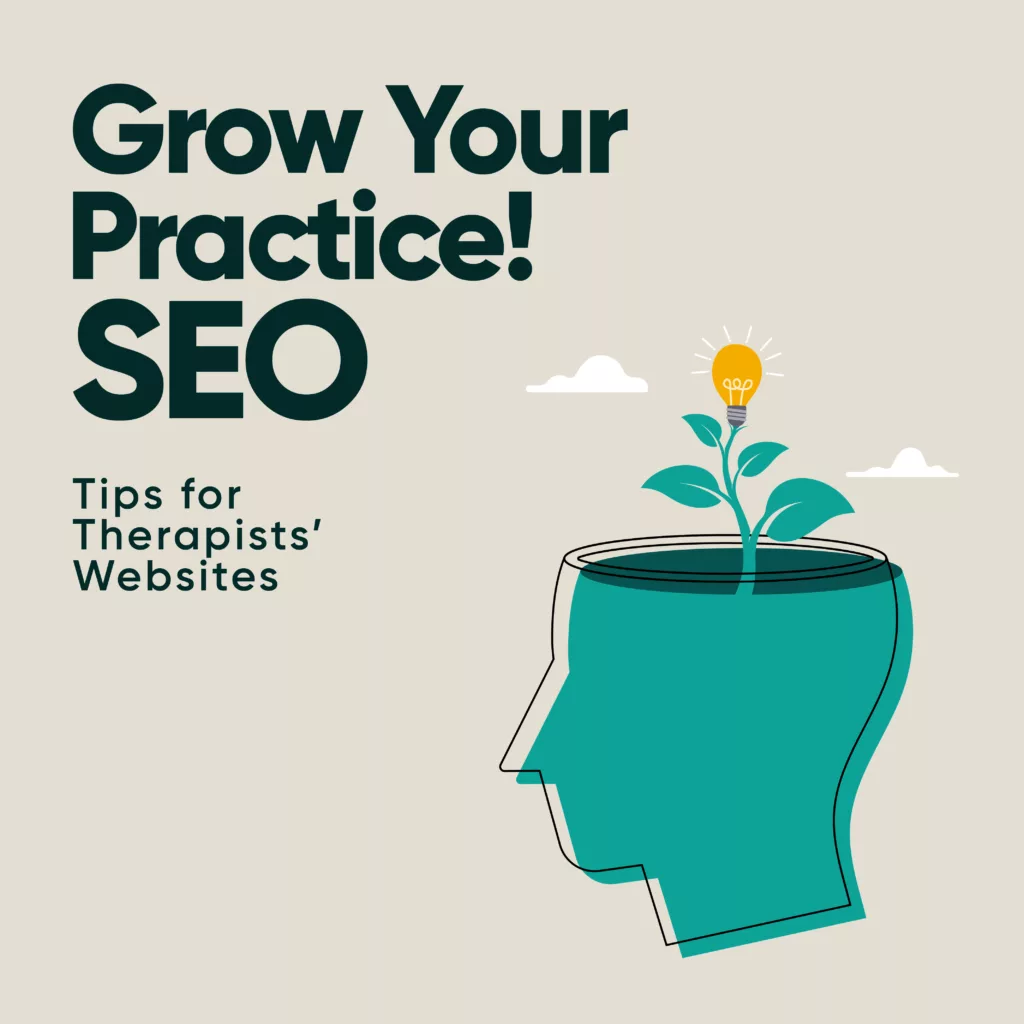Grow Your Practice! Tips on SEO for Mental Health Professionals
Being a therapist in the digital age presents unique challenges and opportunities, especially when it comes to growing your practice.
In this blog, I’m here to equip you with tips on SEO for mental health professionals.
These strategies are not just about technical tweaks; they’re about understanding and leveraging the digital landscape to make your valuable services more accessible and visible to those in need.

What is SEO?
In its simplest form, SEO is the process of making your website more “findable” on search engines like Google.
It’s about using specific strategies and techniques to ensure that when someone types in a search query related to therapy or counseling, your website appears as one of the top results.
For additional insights and guidance, consider exploring my blog titled “Search Engine Optimization for Beginners: FAQs on SEO.” In this piece, I address 15 of the most commonly asked questions about SEO, providing valuable information on what it entails.
Why SEO for Mental Health Professionals is SO IMPORTANT.
The answer lies in visibility and connection. In today’s digital age, the first place people often turn to for finding mental health support is the internet. They might search for terms like “anxiety therapy near me” or “best counselor for depression.”
If your website is optimized for these search terms, it’s more likely to show up in their search results.
This visibility is the first step in connecting with potential clients. And, effective SEO is not just about attracting any visitor; it’s about attracting the right visitors.
People who are actively seeking the services you provide are more likely to engage with your website and reach out for help. This means more opportunities for you to make a meaningful difference in people’s lives.
SEO bridges the gap between your therapeutic services and the individuals who are searching for them. It’s not just about digital marketing; it’s about making sure your valuable skills and compassionate support are accessible to those who need them most. Whether you’re a solo practitioner or part of a larger counseling center, understanding and implementing SEO strategies for mental health professionals is key to expanding your reach and positively impacting more lives.
Keyword Research Is The Most Important Part of SEO for Mental Health Professionals
Keyword Research: Finding What Your Potential Clients are Searching For
What’s keyword research?
Keyword research is figuring out exactly what words and phrases people are punching into Google when they’re on the lookout for something.
For those in the therapy or mental health field, this means digging into the specific terms folks use when they’re searching for counseling or mental health advice online. The whole idea here is to get a clear picture of these keywords so you can sprinkle them throughout your website. Why?
Because this is how you climb up those Google search results. When someone’s in need of the services you offer, you want your site to pop up right in front of them.
It’s a big piece of the SEO puzzle, making sure your site isn’t just a needle in the digital haystack. So yes, keyword research is pretty key. It’s all about connecting thos
How to Identify Relevant Keywords
Now, how do you find these magical keywords? Here are some practical steps:
Start with Brainstorming: Put yourself in your clients’ shoes. What kind of help might they be looking for? List down everything that comes to mind.
Use Keyword Research Tools: Tools like Google Keyword Planner, SEMrush, or Ahrefs can help you find related terms and show how often they’re searched for. This insight is invaluable.
Analyze Competitors: Check out other therapists’ websites, especially those who rank high in search results. See what keywords they are using, but remember, your goal isn’t to copy but to get inspired and do it better.
Focus on Relevance: Not all keywords are equal. “SEO strategies for mental health professionals” is a great example of a specific, relevant keyword that can attract the right audience. It’s targeted and directly speaks to the services you offer.
Think Locally: If you offer services in a specific area, include location-based keywords like “therapy services in [Your City].”
Keep Updating Your List: Keyword trends can change. Regularly updating your keyword list ensures you stay relevant and visible.
The Power of Keyword Planning
Strategic Keywords
Think of keywords like the words people use when looking for things online. We want to identify the right words for your practice. It’s not about forcing these words into your content; it’s about naturally using them in a way that matches what your practice is all about.How to Start: Listen to your audience. What words do they use when searching for services like yours? These are your strategic keywords.
Use them wisely: No need to stuff your content. Just sprinkle these words naturally, aligning them with what your practice offers.
Long-Tail Keywords
Now, long-tail keywords are like the superheroes of keywords. They’re specific phrases that make your content stand out.Why they’re awesome: These phrases attract people who are specifically looking for what you offer. It’s like guiding the right folks straight to your digital doorstep.
How to use them: Think about what your audience might type when they’re really focused on finding something. Those are your long-tail keywords.
5 Essential SEO Strategies for Therapists' Websites
Keyword Integration
I’ve found that seamlessly integrating keywords is like adding those comfortable, familiar words that make clients feel understood. We’re not just aiming for visibility here; we’re aiming for resonance. Whether it’s “counseling for stress” or “support for anxiety,” I guide therapists in using these keywords naturally throughout their content. Think of it as inviting someone into a comforting conversation – making them feel seen and heard.
Optimizing Meta Tags: Crafting Invitations, Not Just Clicks
Your online presence should be like a warm welcome. Meta tags, those snippets in search results, are like your virtual handshake.
Crafting compelling titles and descriptions isn’t just about keywords; it’s about extending a friendly invitation.I’ve seen the impact of making these snippets not just informative but engaging. It’s about making potential clients curious, eager to click, and explore the supportive environment you offer.
Quality Content Creation: Building Trust, One Word at a Time
Let’s talk content – not the fancy, jargon-filled kind, but the kind that builds trust.It’s not just about showcasing expertise; it’s about creating a space that feels like a cup of tea on a cozy evening – comforting and inviting.
Quality content is the bridge that connects you with clients before you even meet, fostering a sense of trust and understanding.
Local SEO for Therapists: Becoming a Trusted Neighbor
Think local. Local SEO is like becoming the go-to neighbor for therapeutic support. I walk therapists through claiming their Google My Business listing, ensuring that contact details are spot on, and encouraging satisfied clients to share their positive experiences. It’s not just about being found online; it’s about being the trusted therapist around the digital corner.
User-Friendly Website Design
Your website is your virtual space, and I know firsthand that a welcoming space matters.
It’s like arranging your virtual office to feel as comfy as your real one. Clear menus, easy navigation, and mobile-friendly design – because your clients might be reaching out for support right from their phones.
Writing for Success - Tips and Techniques on SEO for Mental Health Professionals
#1. Striking the Right Balance:
When it comes to penning down your thoughts, it’s crucial to find that delicate equilibrium between catering to search engines and creating genuine value for your readers. Yes, keywords are essential, but remember, your primary audience is human, not algorithms. Let your content provide depth, insight, and real assistance to those seeking therapeutic guidance.
Tip: Aim for a sweet spot of around 2,000 words or more in your blog posts. Not only does this signal to search engines that your content is substantial, but it also allows you to delve into topics with the necessary depth.
#2. Crafting Headlines That Captivate:
Your headline is your first impression on a potential reader and a search engine. Make it count. Incorporate your target keywords naturally and create headlines that are not only informative but also enticing. Think about the questions your audience might have and address them right in your headlines.
Tip: Strategically use the first 20-70 characters of your headline for primary keywords. For example, “Unraveling the Complexities of Anxiety: A Therapist’s Guide.”
#3. Write Clearly and Concisely:
SEO success isn’t just about the words on the page; it’s also about the reader experience. Keep your content clear, concise, and easily digestible. Avoid unnecessary jargon or overly complex language. Think of your audience as individuals from various walks of life, and ensure your content is accessible to all.
Tip: Utilize tools like Grammarly and Hemingway Editor to enhance the readability of your writing. Short, simple sentences often make a more significant impact.
#4. Incorporate Keywords Effectively:
Your chosen keywords should seamlessly integrate into your content. Don’t force them; instead, let them naturally flow within your narrative. Google can distinguish between genuine, helpful content and keyword stuffing. Use your selected keywords 4-6 times in long-form content, ensuring they complement the overall context.
Tip: Introduce keywords in your introduction, subheadings, and organically within the body of your content. This creates a coherent and informative piece.
#5.Add Visuals for Engagement:
Incorporating images and videos into your content is paramount.
Not only do they enhance the overall appeal of your blog, but they also contribute to SEO. Search engines value multimedia elements when determining the relevance and quality of content.
Tip: Optimize your images by adding descriptive ALT text. This not only improves accessibility but also provides another opportunity to include relevant keywords.
#6. Link Strategically
Both outbound and internal links play a significant role in SEO.
Outbound links to reputable sources signal credibility to search engines, while internal links keep readers engaged on your website. When referencing external content, ensure it adds value to your narrative.
Tip: Include 2-4 internal links in each post, guiding readers to related articles on your website. This not only improves SEO but also encourages visitors to explore more of your valuable content.
#7. Optimize Beyond Content:
SEO doesn’t stop with the last sentence of your blog. Consider these additional optimization steps to further enhance your online presence:
URL Optimization –
Craft clean and keyword-inclusive URLs for your blog posts. This small yet impactful detail contributes to higher search engine rankings. To delve deeper into this concept, I’ve written a blog titled “Finding the Perfect Keywords for Your Blogs.” This article will provide in-depth insights to enhance your website’s visibility on search engines.Title Modifiers –
Strengthen your headers by incorporating title modifiers such as “How to,” “Best,” or “Easy.” These words are commonly searched and can elevate the impact of your headlines.
Tip: Integrate your primary keywords into the first 100-150 words of your article. This ensures search engines immediately recognize the relevance of your content.
#8. Ensure Mobile-Friendly Accessibility:
A mobile-friendly and responsive website is non-negotiable. Work with experts to guarantee that your therapeutic insights are easily accessible and visually appealing across all platforms.
Tip: Test your website on different devices to ensure optimal performance. A seamless mobile experience contributes significantly to user satisfaction.
A Step-by-Step Guide to Planning Content
Planning your content with SEO in mind is key to online success. Let’s simplify the process into easy steps:
Know Your Audience – Take time to delve into the lives and challenges of your audience. Reflect on their experiences, concerns, and aspirations. Empathy lies at the heart of effective content planning.
Outline Your Objectives – What are your long-term goals? Do you want to educate, inspire, or provide practical solutions? Clarifying your intent helps shape the tone and direction of your content.
Research and Brainstorm – Dive into forums, social media discussions, and even conversations with your clients. What questions repeatedly surface? What topics generate the most interest? These insights are gold mines for content ideas.
Identify Key Themes – Group your content ideas into overarching themes or categories. For instance, if you specialize in anxiety therapy, themes might include coping strategies, mindfulness practices, or lifestyle changes.
Map Out a Content Calendar – Establish a content calendar outlining when each piece will be published. This helps maintain consistency and ensures a diverse range of topics over time.
Diversify Content Formats – Explore various content formats—blogs, videos, podcasts—to cater to different preferences within your audience. Some might prefer reading while others engage better with visual or auditory content.
Review and Adapt – Regularly review your content’s performance. Which topics resonate the most? Which formats garner the most engagement? Adapt your future content strategy based on these insights.
Ready to start with budget-friendly SEO solutions?
So, there you have it – SEO for mental health professionals, especially therapists, is a crucial ingredient for business success.
If all the technical stuff feels a bit much, don’t worry. At Strong Roots Web Design, we’ve got simple and affordable SEO solutions just for therapists like you.
We take care of everything, from checking your website thoroughly to finding the best keywords for you.
Plus, we provide ongoing support and regular reports so you can see your online presence grow.
Forget the tech hassle and focus on helping people. Start with us today, and let your therapist website shine online!
Related Reads:
- SEO for Therapists: The Top 3 Tips – Therapist Website Design
- Learn SEO for Private Practice and your content strategy for your website
- The Ultimate SEO Guide For Therapists
- Unlocking the Power of SEO Keywords for Therapists
- Search Engine Optimization for Beginners: FAQs on SEO
- Find the Right Longtail Keywords For Your Blogs | Local SEO Strategies
Hi! I’m Sarah.
I help counselors and therapists have a bigger impact on the world through better client connection. I do this by creating beautiful visuals and strategically designed websites.


